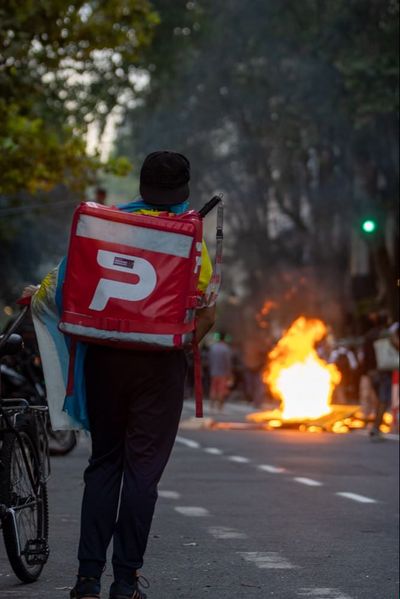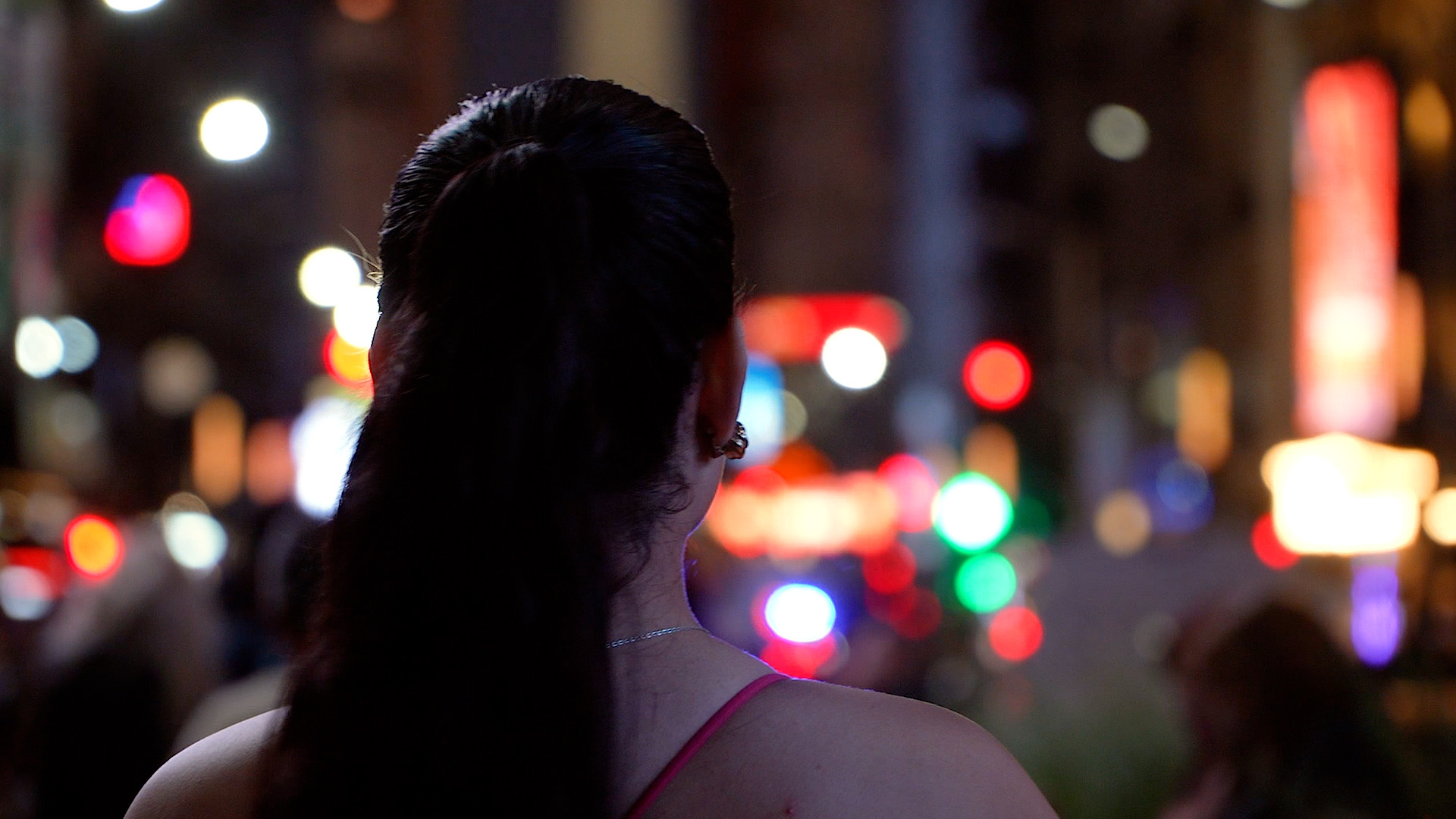The sun has yet to rise over the Buenos Aires skyline, and Milagros Orellana is already on her feet. As the chill of the early morning lingers in the air, the 24-year-old mother of three prepares to face once again a busy schedule. By day, she is the nurturing heart of her family; by night, she becomes a daring, racing street worker weaving through traffic to deliver food, groceries, and other goods to customers on the streets of Buenos Aires in some of the toughest neighborhoods. She risks her life nightly to earn a little extra money based on how far she peddles her bike and the time it takes to get there.
Orellana weaves through the chaotic streets with a sharp focus. On two wheels, she’s part of a fierce, unforgiving world where survival depends on quick reflexes and cold determination. As a woman in a male-dominated gig, she faces a constant push-and-pull dynamic; men, often dismissive of her presence, see her as competition, while other women eye her with distrust, resenting her for working alongside men in this gritty, high-stress environment.
There’s little room for camaraderie—every person is out for themselves. With the pressure mounting from all sides, Orellana has learned to keep her guard up and her eyes always scanning the road. With each shift, she pushes through exhaustion, balancing the weight of her children's needs with the demands of an unforgiving gig economy. The clock is her constant enemy, as she races against time, each delivery another small victory in the ongoing struggle for her family’s survival.

Milagros is a Rappi driver and a member of the growing gig economy in Argentina as people take on multiple jobs just to survive. For Orellana, her resilience comes back to her main purpose, motherhood.
Her life, once defined by the rhythms of motherhood, has been forcibly rewritten by the economic turmoil that has swept through Argentina. Until recently, her husband’s steady income was enough to support their family. But as the country’s financial instability deepens, what was once a stable foundation has crumbled, leaving Orellana with no choice but to step into the world of food delivery.
"I wanted to help him so that he doesn't sacrifice himself or kill himself so much, I decided to start working."
Gig economy has become a central component for many people in Argentina to survive the economic crisis that has been haunting the country for over 100 years. And now with the new president imposing austerity measures to control the economy the ranks of the gig economy workers are swelling adding to the chaos and competition for extra money. It remains to be seen whether President Javier Milei’s cuts can create a more stable economy or not.
For workers, the chaotic economy has meant having to double up on jobs in the gig economy. But for some gig workers the introduction of Milei has meant fewer regulations on how they do business and garnered their support for his style of governance.
Meanwhile others have found jobs in the gig economy doing all kinds of work just to make ends meet. Some have become Uber drivers, others providing tourists lessons in Tango, and many women have found doing OnlyFans work the best way to make extra money. People are waiting to see if Milei’s austerity measures will stabilize the economy and families like Orellana can return to a two-income household or whether the gig economy is here to stay and become a new normal for Argentina.
MULTIPLE JOBS
Traditional work is out, and gig work is in. It has become the new way for society to earn a means of living.
Eduardo Donza, a sociologist who specializes in the labor market, social inequality and poverty, says, “the inflationary crisis that Argentina has suffered for many decades is not a new problem in Argentina.” He is part of the Social Debt Observatory of the Catholic University of Argentina, and a professor at the University of Buenos Aires.
Buenos Aires, the capital city of roughly 15 million people, has become a place compelled to confront the constant challenges of an ever-changing economic landscape like many other cities around the world.
The city faced several economic crises, with the most notable being the 1998–2002 financial collapse, triggered by massive debt, economic mismanagement, and a currency peg to the US dollar.
The crisis led to widespread unemployment, poverty, and social unrest, culminating in the 2001 riots and the resignation of President Fernando de la Rúa. Despite recovery in the mid-2000s, the city has continued to experience periodic economic turbulence, marked by inflation and fiscal instability, which have exacerbated social inequalities.
The gig economy has emerged from the struggle of citizens desperately forced to adapt, reshaping the workforce in its wake. Specifically, online platforms have become the leading recruiter for gig work. Platforms like Rappi, Airbnb, Uber, and OnlyFans have become integrated daily into Buenos Aires society.
Since 2018, Ecolatina, a consulting firm based in Buenos Aires, found that people with multiple jobs rose 25% since 2018.
Matías Rixner carves out a livelihood through the physicality of tango and yoga. At 46, the Buenos Aires-based instructor embraces two practices deeply rooted in Argentine culture – offering tango lessons that celebrate the soul of the dance and yoga sessions that provide calm amid chaos. His dual roles reflect the broader trend in Argentina's gig economy, where tradition and adaptability intersect to meet economic demands.
Rixner’s livelihood is a balancing act between passion and financial uncertainty. “I never know how much I’m going to make… sometimes I’m worried, but it always goes well for me,” he says.

In a country where economic stability is increasingly rare, he has managed to carve out a path by teaching others not only how to move, but how to reconnect – with their bodies, their breath, and the constant flux of life in Buenos Aires.
According to Registro Único de Transporte de Mensajería Urbana y Reparto a Domicilio(RUTRAMUR), there are at least 20,000 gig workers in Buenos Aires alone. However, because of the informality of gig work it is hard to collect exact numbers.
Francisca Pereyra works at the Economics Department of Universidad Nacional General Sarmiento (Argentina), focusing on work, gender, and the platform economy. Over the past five years, she has led projects examining the experiences, opportunities, and challenges faced by low-income women due to the rise of digital labor platforms in Argentina. She said that gig work increased during the pandemic and that everything that was delivery activity grew even more because it became an essential service. Today, people rely on delivery for convenience.
Milei’s deregulation of the state has opened the doors for more people to work in the gig economy, doubling up their jobs like Orellana’s family and changing how family’s function.
"It’s not a topic in the political agenda today, unfortunately from what we understand this president doesn’t believe in the regulation of the state."
As the ranks of gig workers has grown so too have the types of jobs people are jumping into for more money. Many women find themselves restricted from some gig jobs like food delivery with its male dominated culture and bare-knuckled competition and pushed towards sex work where money can bring big rewards.
In the Rhythm of Enough
ONLY YOU
In the dimly lit room of a rented hotel, with a stripper pole gleaming under neon lights and a bathtub in the middle of the room that promises to become the backdrop of another sensual scene, 23-year-old Marisol Fernández, sets up her camera. A quick check of her phone reminds her why she’s there: the demand for exotic content on OnlyFans has been her lifeline in a country that was unraveling at the seams. With Argentina's economic crisis tightening its grip, Fernández and many women like her, left behind the hustle of traditional work and turned to the gig economy, where their body, confidence, and creativity are their greatest assets.
The hotel room, rented for just three hours, is her studio—her safe space to perform, create, and, most importantly, survive in a financial landscape that offers few options for young women like her. As the country grapples with inflation and unemployment, Fernández’s world now revolves around the precarious balance between her online persona and the unpredictable market she’s learned to navigate—one click at a time.

Through Only Fans and Telegram, a messaging app, she has been able to survive. Her increased platform has also been able to get her a “sugar daddy,” which is typically an older man who gives gifts or money for a younger woman’s company and sometimes sex work. She sees him and spends a day with him during the week in exchange for up to $300 USD, which is about $323,000 in Argentine pesos. Only knowing him for five months, he has gifted her many things like jewelry, handbags, shoes, and expensive perfumes.
Fernández briefly escaped the shackles of the economic crisis and fled to Mexico for love and a better life. After a year, she was stunned when she found herself back in Buenos Aires and had returned back to her home country only to be welcomed by an even worse economic state then before.
“When I returned to my life here in Buenos Aires I started earning $400, $500 US dollars And I decided to open the Only Fans. I started generating more income, like in the first months $800 to $1000.”
Now working less hours and earning more than a normal salary in Argentina, Fernández says, “I have more free time to go out with my friends, travel, do what I like, and I don't have to ask permission from anyone, no boss, no work license, or even wait until I have holidays to be able to do what I really like.”
According to Only Fam, a third-party website that tracks and ranks OnlyFans creators based on various metrics like popularity, subscriber count (if available), earnings estimates, and content type, logs that there are roughly 5,322 OnlyFans creators based in Argentina, 1,399 alone based in Buenos Aires. However, the number can potentially be four to five times higher as many creators don’t disclose their locations.
Gig work has evolved over the years. While it’s still male-dominated, more women are now entering the field.
"You register on a platform, so it's all much more anonymous, more impersonal, and that encouraged many women to try their luck."
In 2023, President Milei’s went into office cutting many female-focused programs, like the Ministry of Women, Gender, and Diversity. Leaving many women with fewer resources—pushing some, like Fernández, toward platforms like OnlyFans for income.
OnlyFans saw a global surge in users during the 2020 pandemic. According to UpMarket, an investment platform, in 2023, creator growth outpaced fans, rising 29.4% year-over-year compared to a 27.7% increase in subscribers.
Both Fernández and Orellana dream of returning to school. Fernández hopes to resume her university studies in psychology, while Orellana aims to finish high school and eventually pursue a degree in mathematics. However, for now, Fernández and thousands of other women shape their reality through the content they create on OnlyFans, where their identity, income, and aspirations are closely tied. Meanwhile, Orellana and other Rappi drivers' realities revolve around the fast-paced demands of their deliveries.
IN MOTION: CHARTING THE FUTURE OF GIG WORK
For all, the gig economy represents a means to survive and thrive in a country where traditional jobs are increasingly difficult to secure, and gig work has become a vital lifeline in Argentina.
In Buenos Aires, the stories of a Rappi driver, an OnlyFans creator, and a tango and yoga instructor paint a vivid picture of the gig economy that has taken root amid the country’s ongoing economic struggles.
Donza explains that if inflation falls from 25% to 3% within a year, it would mark significant success for any government. He says this is the Milei administration’s strongest indicator of economic stability and a key factor in its growing public support.
“One of the main successes is the decrease in inflation and the increase in prices,” says Donza.
Each of them, in their own way, navigates the uncertainty, crafting livelihoods through flexibility and adaptability, relying on platforms that offer both opportunities and risks. But as they hustle to survive, the weight of Argentina’s economic crisis looms large, a crisis that continues to leave millions grappling with inflation, unemployment, and instability.
Because of the constant economic need for survival many parents, like Orellana and her husband, are forced to miss chapters in their children’s lives.
"There are things he wants to do with the kids, and he can't because he's working. And there are things I want to do with my children, and I can't because I'm working. So, both of us are losing things because of our children. We both understand that if we don't work, we don't have money to buy things for our children."
While these gig workers are resourceful, their individual triumphs are mere patches in a much larger fabric of systemic challenges. As they chase financial stability, the question remains: can the country ever resolve this crisis, or is survival in the gig economy the new normal for generations to come?
Orellana’s 13-year-old brother, whom she has cared for since their mother’s death, represents the future of gig work. Juggling school and teenage life, he also works as a Rappi driver, navigating the same streets and traffic that his sister faces.

